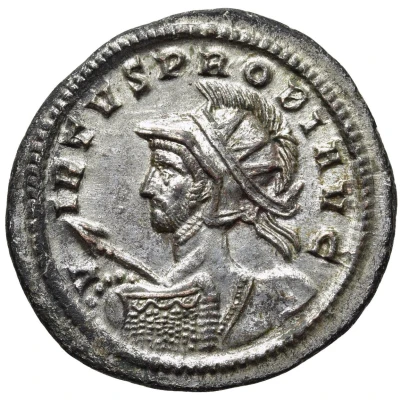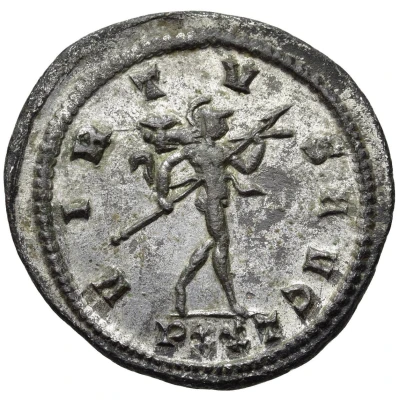Antoninianus - Probus Imperial mantle, left, sceptre surmounted by eagle; VIRTVS AVG; Victory
| Silver | - | - |
| Issuer | Rome › Roman Empire (27 BC - 395 AD) |
|---|---|
| Emperor | Probus (Marcus Aurelius Probus) (276-282) |
| Type | Standard circulation coin |
| Years | 277-278 |
| Value | Antoninianus (1) |
| Currency | Antoninianus, Reform of Caracalla (AD 215 – 301) |
| Composition | Silver |
| Shape | Round (irregular) |
| Technique | Hammered |
| Orientation | Variable alignment ↺ |
| Demonetized | Yes |
| Updated | 2024-10-05 |
| Numista | N#293548 |
|---|---|
| Rarity index | 100% |
Reverse
Soldier, helmeted, in military attire, standing left, holding Victory in right hand and spear in left hand; to right, shield.
Sometimes star (✶) in field.
Value (XXI) and officina (Q) mark in exergue. Sometimes no field or exergue mark at all.
Script: Latin
Lettering: VIRTVS AVG
Unabridged legend: Virtus Augusti.
Translation: Courage of the emperor.
Comment
RIC 435 was minted by the 4th officina (QXXT) of the Ticinum mint (QXXT). The XX stands for 20 parts alloy (instead of the more usual XXI for a copper to silver ratio of 20:1). The original RIC text mentions 5 variations/different bust types (bust types according to Pierre Bastiens grouping of bust types; see illustrated: probvs.net), and also multiple variants are known to exist:
- Radiate, draped, right (A bust (*) (example: probuscoins.fr #3610), Numista #292783);
- Radiate, cuirassed, right (B bust (example: probuscoins.fr #2114), Numista #293547);
- Radiate, wearing imperial mantle, left, holding sceptre surmounted by eagle in right hand (H2 bust (example: probuscoins.fr #2115), Numista #293548);
- Radiate, cuirassed, left (B1 bust (example: probuscoins.fr #2601), Numista #293549);
- Radiate, cuirassed, left, with spear and shield (F1 bust (**) (example: probuscoins.fr #2174), Numista #421503);
- [var] Radiate, draped and cuirassed, right (A2 bust (*) (example: probuscoins.fr #328), Numista #421450);
- [var] Radiate, cuirassed or draped, left, with spear and shield, from behind (F8 bust (**) (no example on probuscoins.fr), Numista #421446);
- [var] Radiate, wearing imperial mantle, right, holding sceptre surmounted by eagle in right hand (H4 bust (example: probuscoins.fr #3576), not in Numista);
- [var] Radiate, cuirassed bust left, holding Victory in right hand (I5 bust (example: probuscoins.fr #2897), not in Numista);
- [var] Radiate, heroically nude, left, holding spear in right hand and square shield (aegis) in left hand, from behind (bust F19 (example: probuscoins.fr #274), not in Numista).
(*) RIC only lists the A bust (Probus, draped, right) and not also the A2 bust (Probus, draped and cuirassed, right) for RIC 435. See for example RIC 434 where the A2 and A bust are separately listed.
(**) RIC only lists the F1 bust and not the F8 bust which is “seen from back”. See for example RIC 611 where the F1 and F8 bust are separately listed.
According to Pink, RIC 435 – with its obverse lettering nr. 1 (‘IMP C M AVR PROBVS AVG’) combined with “VIRTVS AVG” and exergue mark QXXT – is part of the 2nd emission (year 276), 3rd emission (277) and 4th (B) emission (278). See: Karl Pink, Der Aufbau der römischen Münzprägung in der Kaiserzeit VI/I, Wien, 1949, p. 49-41. According to Pink, the A, A2 and B bust were used during the 2nd emission sometimes combined with a star (✶) in field, the A2 bust was not used in the 3rd emission anymore and the F1 bust started being used and the star (✶) was used this emission as well (see, example of star in field: probuscoins #3152) and then only again in the 10th emission. The ‘special’ busts (F19 and I5) are of the 4th emission (year 278), because during that emission Probus' victory over the German tribes was celebrated, which resulted in all kinds of special obversus, reverses and legends, including the introduction of heroic busts and the abundant depiction of Victory. See Pink, p. 50. About Probus' Germanic campaign and its effects on the Ticinum mint, see also: S. Estiot, Une campagne germanique de l'empereur Probus: l'atelier de Ticinum en 277-278, Droz p. 207-247, 2006. RIC also lists that this coin may occur without any exergue or field mark, which can also be attributed to the 4th emission as coins given away during Probus' arrival in Ticinum.
Interesting fact
The Antoninianus - Probus coin was part of a series of coins issued during the reign of Emperor Probus (276-282 AD) to celebrate the Roman Empire's victory over the Goths. The coin's design features an image of Victory (VIRTVS AVG) on the reverse, symbolizing the empire's triumph. The coin's minting was a significant event in the history of Roman numismatics, as it marked a shift towards using silver coins as a standard medium of exchange, rather than the previous bronze coins. This change in minting practice was a result of the economic reforms implemented by Emperor Probus, who aimed to stabilize the empire's economy and promote trade.

